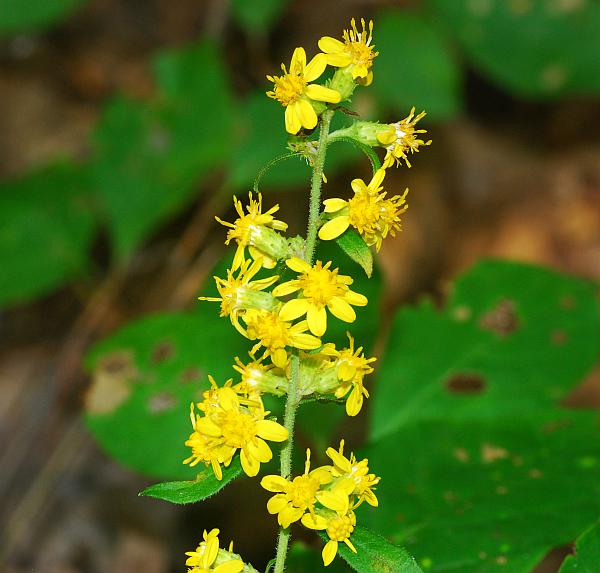Solidago buckleyi Torr. & A. Gray
Goldenrod

Native
CC = 8
CW = 5
MOC = 27
© SRTurner
Solidago buckleyi Torr. & A. GrayGoldenrod | |
 |
Native CC = 8 CW = 5 MOC = 27 |
© SRTurner |
|
Family - Asteraceae/Astereae Habit - Perennial herb with short rootstock, not rhizomatous. Stems - Ascending to erect, 1 to several, to 1.2 m, moderately pubescent, sometimes sparsely toward the base.
Leaves - Basal leaves absent at flowering. Stem leaves centrally disposed, with largest leaves 1/3 to 1/2 way up stem. Basal and lowermost stem leaves with the blade 6-12 cm long, 2-5 cm wide, relatively thin, sessile or short-petiolate, sharply pointed, the margins usually sharply toothed and hairy, the upper surface glabrous or sparsely to moderately short-hairy along the main veins, the undersurface moderately pubescent along the veins, with 1 main vein. Median and upper stem leaves to 15 cm long, the uppermost usually lanceolate to narrowly elliptic, otherwise similar to the lower stem leaves.
Inflorescence - Axillary clusters grading into a narrow, roughly cylindrical racemose panicle, the heads oriented in several directions.
Heads - Involucre 4.5-6.0 mm long, the bracts in 3 or 4 unequal series. Involucral bracts sharply pointed at the tip, appressed-ascending, the outermost usually with spreading to recurved tips, the margins hairy, the outer surface usually hairy. Receptacle naked.
Florets - Ray florets 6-9, the corollas 3.5-5.0 mm long, yellow. Disc florets 8-15, the corollas 4-5 mm long, the lobes 0.9-1.5 mm long, yellow. Pappus 4-5 mm bristles.
Fruits - Fruits 2-3 mm long, narrowly obovoid, glabrous at maturity. Flowering - September - October. Habitat - Glades, ledges, bluff tops, upland forests, savannas. Origin - Native to the U.S. Other info. - This is one of the showier goldenrods, having relatively large ray florets and an attractive, omindirectional spikelike inflorescence. The Ozark Division is the center of its global range, which is limited to small portions of only four nearby states. It is a conservative plant, assigned a conservatism coefficient of 8. It is easily mistaken for S. petiolaris, which is similar in appearance but with narrower leaves which lack conspicuous teeth. These two species are unique among the Missouri goldenrods in having involucral bracts with spreading tips. Photographs taken at Pickle Springs Natural Area, Ste. Genevieve County, MO, 9-19-2009, and at Hawn State Park, Ste. Genevieve County, MO, 9-24-2011 (SRTurner). |